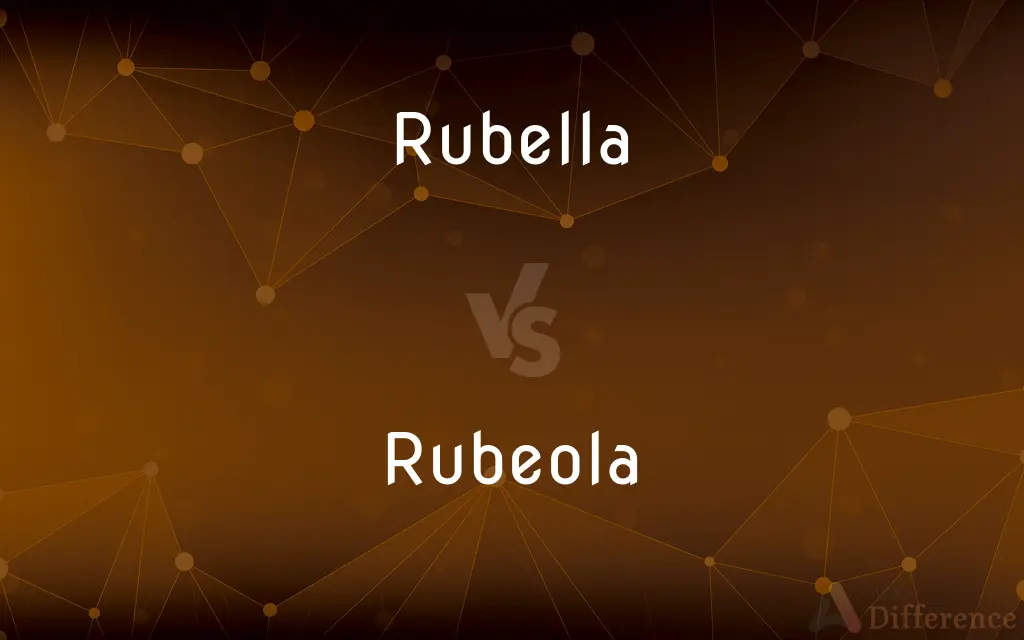Rubella vs. Rubeola — What's the Difference?
By Tayyaba Rehman & Urooj Arif — Updated on April 7, 2024
Rubella, a mild viral infection known as German measles, is characterized by rash and fever, whereas rubeola, or measles, is more severe and highly contagious.

Difference Between Rubella and Rubeola
Table of Contents
ADVERTISEMENT
Key Differences
One of the key differences between rubella and rubeola is their causative agents. Rubella is caused by the rubella virus and is typically transmitted through airborne droplets from the respiratory secretions of infected individuals. Whereas rubeola is caused by the measles virus, a different pathogen, although it is also spread through respiratory droplets, the measles virus is considered more contagious, with a higher replication rate, leading to more widespread outbreaks when unvaccinated populations are exposed.
The incubation period and the severity of the symptoms also differ between the two diseases. Rubella has an incubation period of 14 to 21 days and often results in symptoms so mild that they may go unnoticed, especially in children. In contrast, rubeola has a shorter incubation period of 10 to 14 days, and its symptoms are usually more intense and debilitating, often requiring medical intervention due to the risk of severe complications.
Vaccination plays a crucial role in the prevention of both rubella and rubeola. The MMR vaccine, which protects against measles, mumps, and rubella, has significantly reduced the incidence of these diseases in countries where it is widely administered. However, despite the availability of effective vaccines, outbreaks still occur, primarily in populations with low vaccination rates. The global vaccination efforts against rubeola have been more aggressive due to its higher contagion and severity, aiming for eradication, while rubella vaccination is also emphasized for the protection of pregnant women and their fetuses.
Despite their similarities in terms of being viral and preventable through vaccination, rubella and rubeola differ significantly in terms of their impact on health, severity, and the global health strategies employed to control them. While rubella poses the greatest risk to unborn babies, leading to a focus on vaccinating women of childbearing age, the global health approach to rubeola focuses on widespread vaccination due to its high contagion rate and potential for severe outcomes.
Comparison Chart
Cause
Rubella virus
Measles virus
ADVERTISEMENT
Severity
Generally mild
More severe and can lead to serious complications
Contagiousness
Less contagious than rubeola
Highly contagious
Symptoms
Low-grade fever, rash, swollen glands
High fever, cough, runny nose, blotchy rash
Vaccination
Included in MMR vaccine
Also included in MMR vaccine
Incubation Period
14 to 21 days
10 to 14 days
Global Health Strategy
Focus on vaccinating women of childbearing age
Aggressive vaccination efforts aimed at eradication
Compare with Definitions
Rubella
Preventable by the MMR vaccine.
The MMR vaccine has made rubella a rare disease in many countries.
Rubeola
Causes more severe symptoms and complications than rubella.
Complications from rubeola can include pneumonia and encephalitis.
Rubella
A viral infection causing a red rash and mild fever.
After contracting rubella, the child developed a rash that lasted for three days.
Rubeola
A highly contagious viral infection characterized by a blotchy rash and fever.
The rubeola outbreak in the community led to many hospitalizations.
Rubella
Known as German measles, less severe than rubeola.
Unlike rubeola, rubella's symptoms are relatively mild and short-lived.
Rubeola
Focus of global eradication efforts.
The WHO has initiated efforts to eradicate rubeola through vaccination.
Rubella
Spread through respiratory droplets.
Rubella spread through the school after a student came in with a rash.
Rubeola
Has a shorter incubation period than rubella.
Symptoms of rubeola appeared two weeks after exposure.
Rubella
Can lead to congenital rubella syndrome if contracted during pregnancy.
Pregnant women are advised to ensure their rubella vaccination is up to date.
Rubeola
Also preventable by the MMR vaccine.
Widespread use of the MMR vaccine has dramatically reduced rubeola cases worldwide.
Rubella
Rubella, also known as German measles or three-day measles, is an infection caused by the rubella virus. This disease is often mild with half of people not realizing that they are infected.
Rubeola
See measles.
Rubella
A mild contagious eruptive disease caused by a virus and capable of producing congenital defects in infants born to mothers infected during the first three months of pregnancy. Also called German measles.
Rubeola
Measles
Rubella
(pathology) A mild disease caused by the Rubella virus infecting the respiratory tract, and characterised by a rash of pink dots, fever and swollen lymph nodes.
Rubeola
The measles.
Rubella
An acute but mild viral infection characterized by a dusky red cutaneous eruption resembling that of measles, but attended by only mild respiratory problems or fever; - called also German measles. The infective virus is called Rubella virus, or Rubivirus. If contracted by a woman during the first several months of pregnancy, rubella may cause serious abnormalities in the fetus.
Rubeola
An acute and highly contagious viral disease marked by distinct red spots followed by a rash; occurs primarily in children
Rubella
A contagious viral disease that is a milder form of measles lasting three or four days; can be damaging to a fetus during the first trimester
Common Curiosities
What are the complications associated with rubella and rubeola?
Rubella can cause congenital rubella syndrome in unborn babies, while rubeola can lead to pneumonia, encephalitis, and even death.
How are rubella and rubeola transmitted?
Both are transmitted through respiratory droplets, but rubeola is more contagious than rubella.
Why is vaccination important for rubella and rubeola?
Vaccination prevents the diseases, protects populations, and is crucial for global health efforts aimed at reducing or eradicating these infections.
What is rubella?
Rubella, or German measles, is a viral infection causing a mild rash and fever, mostly affecting children and young adults.
What is rubeola?
Rubeola, simply known as measles, is a highly contagious viral infection that causes severe symptoms, including a blotchy rash and high fever.
Can rubella and rubeola be prevented?
Yes, both can be effectively prevented with the MMR vaccine, which immunizes against measles, mumps, and rubella.
What is congenital rubella syndrome?
A condition caused by rubella infection in pregnant women, leading to serious birth defects in the baby.
Are rubella and rubeola the same?
No, they are caused by different viruses and vary in severity, symptoms, and complications.
How effective is the MMR vaccine?
The MMR vaccine is highly effective in preventing measles, mumps, and rubella, significantly reducing the incidence of these diseases.
Can adults get vaccinated against rubella and rubeola?
Yes, adults who have not been vaccinated or are unsure of their vaccination status should get the MMR vaccine.
Share Your Discovery

Previous Comparison
Dragon vs. Basilisk
Next Comparison
Bomb vs. BombshellAuthor Spotlight
Written by
Tayyaba RehmanTayyaba Rehman is a distinguished writer, currently serving as a primary contributor to askdifference.com. As a researcher in semantics and etymology, Tayyaba's passion for the complexity of languages and their distinctions has found a perfect home on the platform. Tayyaba delves into the intricacies of language, distinguishing between commonly confused words and phrases, thereby providing clarity for readers worldwide.
Co-written by
Urooj ArifUrooj is a skilled content writer at Ask Difference, known for her exceptional ability to simplify complex topics into engaging and informative content. With a passion for research and a flair for clear, concise writing, she consistently delivers articles that resonate with our diverse audience.














































